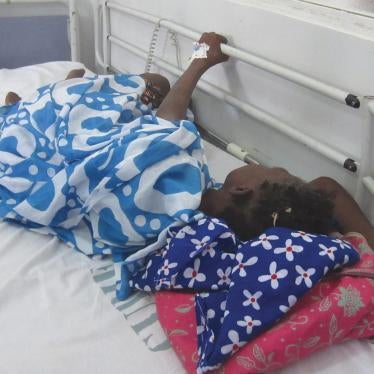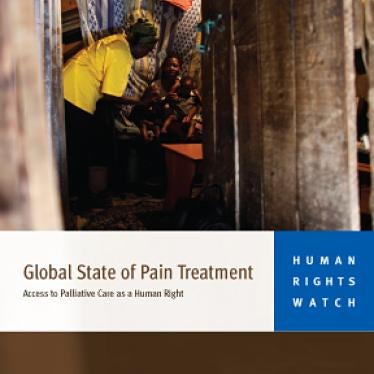(Dakar) – Tens of thousands of patients in Senegal suffer from excruciating pain every year without relief, Human Rights Watch said in a report released today. Unnecessarily restrictive government regulations and poor training for healthcare workers impede their effective medical treatment.
The 85-page report, “Abandoned in Agony: Cancer and the Struggle for Pain Treatment in Senegal,” found that 70,000 Senegalese each year need what is known as palliative care to control symptoms related to chronic, life-threatening diseases. Morphine is an essential and inexpensive medication for treatment of severe pain, but Senegal only imports about one kilogram of morphine each year – enough to treat about 200 cancer patients. Human Rights Watch also found that morphine is unavailable outside of Dakar, Senegal’s capital. Frequent shortages limit access to the medication in the capital as well.
“Many thousands of cancer patients and other Senegalese suffer unnecessary agony because they can’t get morphine to treat their pain,” said Angela Chung, health and human rights fellow at Human Rights Watch. “Senegalese officials should ask themselves whether they would want their own parents or children – or themselves – to suffer such pain when there is a cheap and effective way to relieve it.”
Human Rights Watch interviewed more than 170 patients, family members, medical personnel, and officials about the problem. Many patients said they were in too much pain even to be interviewed.
“I am in pain 24 hours a day,” said a 47-year-old man in Dakar who has prostate cancer and suffers during morphine shortages. “You cannot believe the pain I have all over my body. It is in my bones. I cannot have a real life without my medication. I try to bear the pain for 2 or 3 days, and when I cannot handle it I will take one pill … I went to all the pharmacies and they do not sell it.”
Severe pain and other debilitating symptoms are common among patients with cancer, HIV, and other life-threatening diseases, particularly during the later stages. Non-communicable diseases, such as cancer, heart and lung disease, and diabetes account for about 30 percent of deaths in Senegal. Cancer, which is often diagnosed late in Senegal, kills more Senegalese than HIV/AIDS, tuberculosis, and malaria combined.
The report identified four key obstacles to improving pain treatment and palliative care:
· Lack of training.Most doctors in Senegal do not know how to assess or treat severe pain because the government has not included instruction on the topic in medical or nursing curricula.
· Lack of integration of pain treatment into health services. There is no national plan for cancer, most other non-communicable illnesses, or for palliative care. Cancer care and pain treatment are centralized only in Dakar.
· Poor drug supply.Senegalese hospitals rely on the National Pharmacy (Pharmacie National D’Approvisionnement, PNA) for their supply of essential medications. While morphine pills are on the list of Senegal’s essential medicines, the National Pharmacy has not yet begun importing the medication.
· Restrictive drug regulations. Senegal’s drug regulations are unnecessarily restrictive, making it very difficult for patients, especially those in rural areas, to obtain the medication.
At present, hospitals can only obtain morphine by importing it themselves, a highly complex process that most hospitals are unable or unwilling to undertake. Morphine syrup, which is essential for pediatric palliative care, is not on Senegal’s essential medicines list at all. Official rules limit prescriptions for morphine to one week at a time. As a result, patients or their relatives must travel to Dakar, once a week to get their medications. This is practically impossible for most patients from rural areas.
The Senegalese government has added oral morphine pills to its 2013 list of essential medicines, and the National Pharmacy estimates that it will begin importing morphine at the end of 2013. However, much more work remains to be done to ensure broader public access to oral morphine in pill and liquid form, Human Rights Watch said.
Denying access to pain relief can result in a violation of the right to health under international law and the Senegalese Constitution, as well as a violation of the strict prohibitions against cruel, inhuman or degrading treatment, Human Rights Watch said.
The government of Senegal should lift unduly burdensome restrictions, train medical personnel in the use of pain relief medication, and ensure accessibility of medications that provide pain relief, Human Rights Watch said.
“Who would want to see someone writhing in agony when there is way to relieve their pain,” Chung said. “For cancer patients and others in Senegal in such desperate need of relief, pain medication can and should be part of both curative treatment and end-of-life care.”







